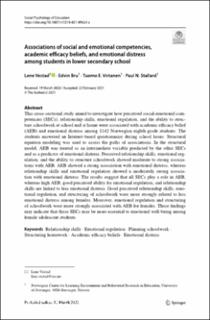| dc.contributor.author | Vestad, Lene | |
| dc.contributor.author | Bru, Lars Edvin | |
| dc.contributor.author | Virtanen, Tuomo Erkki | |
| dc.contributor.author | Stallard, Paul | |
| dc.date.accessioned | 2023-02-15T12:35:54Z | |
| dc.date.available | 2023-02-15T12:35:54Z | |
| dc.date.created | 2021-03-11T11:27:48Z | |
| dc.date.issued | 2021 | |
| dc.identifier.citation | Vestad, L., Bru, E., Virtanen, T. E., & Stallard, P. N. (2021). Associations of social and emotional competencies, academic efficacy beliefs, and emotional distress among students in lower secondary school. Social Psychology of Education, 24, 413-439. | en_US |
| dc.identifier.issn | 1381-2890 | |
| dc.identifier.uri | https://hdl.handle.net/11250/3051120 | |
| dc.description.abstract | This cross-sectional study aimed to investigate how perceived social-emotional competencies (SECs), relationship skills, emotional regulation, and the ability to structure schoolwork at school and at home were associated with academic efficacy belief (AEB) and emotional distress among 1142 Norwegian eighth-grade students. The students answered an Internet-based questionnaire during school hours. Structural equation modeling was used to assess the paths of associations. In the structural model, AEB was treated as an intermediate variable predicted by the other SECs and as a predictor of emotional distress. Perceived relationship skills, emotional regulation, and the ability to structure schoolwork showed moderate to strong associations with AEB. AEB showed a strong association with emotional distress, whereas relationship skills and emotional regulation showed a moderately strong association with emotional distress. The results suggest that all SECs play a role in AEB, whereas high AEB, good perceived ability for emotional regulation, and relationship skills are linked to less emotional distress. Good perceived relationship skills, emotional regulation, and structuring of schoolwork were more strongly related to less emotional distress among females. Moreover, emotional regulation and structuring of schoolwork were more strongly associated with AEB for females. These findings may indicate that these SECs may be more essential to emotional well-being among female adolescent students. | en_US |
| dc.language.iso | eng | en_US |
| dc.publisher | Springer | en_US |
| dc.rights | Navngivelse 4.0 Internasjonal | * |
| dc.rights.uri | http://creativecommons.org/licenses/by/4.0/deed.no | * |
| dc.title | Associations of social and emotional competencies, academic efficacy beliefs, and emotional distress among students in lower secondary school | en_US |
| dc.type | Peer reviewed | en_US |
| dc.type | Journal article | en_US |
| dc.description.version | publishedVersion | en_US |
| dc.rights.holder | The authors | en_US |
| dc.subject.nsi | VDP::Samfunnsvitenskap: 200::Pedagogiske fag: 280 | en_US |
| dc.source.pagenumber | 27 | en_US |
| dc.source.journal | Social Psychology of Education | en_US |
| dc.identifier.doi | 10.1007/s11218-021-09624-z | |
| dc.identifier.cristin | 1897254 | |
| dc.relation.project | Norges forskningsråd: 299166 | en_US |
| cristin.ispublished | true | |
| cristin.fulltext | original | |
| cristin.qualitycode | 2 | |

